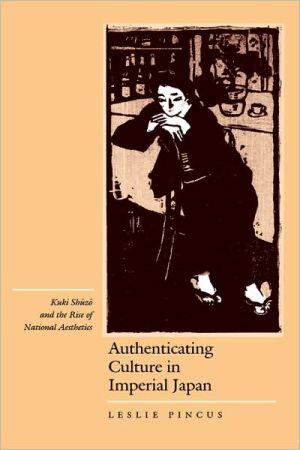
Authenticating Culture in Imperial Japan: Kuki Shuzo and the Rise of National Aesthetics
Оценок пока нет
History
Manga
Формат
Твердый переплет
Страницы
285
Язык
Английский
Опубликовано
Jun 25, 1996
Издатель
University of California Press
Издание
First Edition
ISBN-10
0520201345
ISBN-13
9780520201347
Описание
During the interwar years in Japan, discourse on culture turned sharply inward after generations of openness to Western ideas. The characterizations that arose—that Japanese culture is unique, essential, and enduring—came to be accepted both inside and outside Japan. Leslie Pincus focuses on the work of Kuki Shuzo, a philosopher and the author of the classic "Iki" no Kozo, to explore culture and theory in Japan during the interwar years. She shows how Japanese intellectual culture ultimately became complicit, even instrumental, in an increasingly repressive and militaristic regime that ultimately brought the world to war.
Pincus provides an extensive critical study of Kuki's intellectual lineage and shows how it intersects with a number of central figures in both European and Japanese philosophy. The discussion moves between Germany, France, and Japan, providing a guide to the development of culture in a number of national settings from the turn of the century to the 1930s.
Inspired by the work of Foucault, the Marxist culturalists, and the Frankfurt School, Pincus reads against the grain of traditional interpretation. Her theoretically informed approach situates culture in a historical perspective and charts the ideological dimensions of cultural aesthetics in Japan. Authenticating Culture in Imperial Japan makes an important contribution to our understanding of modernity, nationalism, and fascism in the early twentieth century.
Pincus provides an extensive critical study of Kuki's intellectual lineage and shows how it intersects with a number of central figures in both European and Japanese philosophy. The discussion moves between Germany, France, and Japan, providing a guide to the development of culture in a number of national settings from the turn of the century to the 1930s.
Inspired by the work of Foucault, the Marxist culturalists, and the Frankfurt School, Pincus reads against the grain of traditional interpretation. Her theoretically informed approach situates culture in a historical perspective and charts the ideological dimensions of cultural aesthetics in Japan. Authenticating Culture in Imperial Japan makes an important contribution to our understanding of modernity, nationalism, and fascism in the early twentieth century.
Обзоры
Отзывов пока нет
Станьте первым, кто оставит отзыв о этой книге и поделится своими мыслями
Добавить первый отзывЖурнал чтения
Журналы чтения не найдены
Начните отслеживать ваш прогресс в чтении, чтобы видеть записи здесь
Добавьте ваш первый журнал чтенияЗаметки
Журнал транзакций
Журналы транзакций не найдены
Начните отслеживать ваши книжные транзакции, чтобы видеть записи здесь
Добавьте ваш первый журнал транзакций